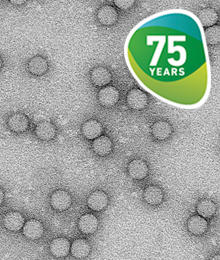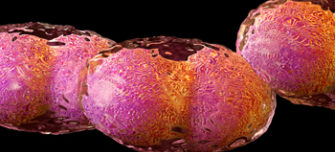Vaccines: the global challenge for microbiology

Vaccines are made from microbes that are dead or inactive, so that they are unable to cause disease. The antigen in a vaccine is the same as the antigen on the surface of the disease-causing microbe. A vaccine stimulates the body to produce antibodies against the antigen in the vaccine. The antibodies created will be the same as those produced if the person was exposed to the pathogen.
If a vaccinated person comes into contact with the disease-causing microbe, the immune system remembers the antibodies it made to the vaccine, and can make them react faster. The person is said to be immune to the pathogen.
Not only do vaccines protect individuals, they can also provide herd immunity. Herd immunity is the resistance of a group of people to an infection. It arises due to the immunity of a high proportion of the population; for example because they have been vaccinated, or have been exposed to the pathogen before. If this proportion is high enough then the small number of people who have no immunity will be protected because there are not enough susceptible people to allow transmission of the pathogen.
Why are vaccines a global challenge for microbiology?
When enough people are vaccinated against a disease it is possible for that disease to be eliminated from the world. For example, in 1980 the World Health Organization (WHO) announced that smallpox had been eradicated. Over past few centuries we have managed to develop successful vaccines for many diseases, including yellow fever, rubella and tuberculosis; however the emergence of new diseases, adaptations of old diseases and global travel, means that novel vaccines are increasingly required. Researchers are continuing to explore new avenues to develop vaccines that can potentially protect vulnerable communities and increase prospects of herd immunity.
We will explore four key areas of vaccination below. Click on each content hub to find out more about microbiologists working in the field of vaccine production and research; as well as accessing our additional resources.
-
How vaccines work
A vaccine is a substance used to stimulate the production of antibodies and provides immunity against one or several diseases. It is given to prevent an infectious disease from developing and the person becoming ill.
-
Vaccine production
Although not all vaccines are especially difficult to produce, some can take a long time to develop because they have to be safe. We will explore why vaccine production is important and where vaccines still need to be developed if we hope to eradicate certain types of disease.
-
Vaccination and herd immunity
Herd or population immunity is the resistance of a group of people to infection. We will explore why vaccines are an incredibly powerful public health tool and the research which aims to protect populations from disease.
-
Disease eradication?
The consequences of high-profile epidemics like Ebola and Zika have been the subject of intense global media attention. We will explore how disease outbreaks can have a significant impact on human populations and how why they need to be closely monitored and contained to limit their potential spread.
Image credits:
royaltystockphoto/iStock
MarianVejcik/iStock
Vera_Petrunina/iStock
Cameron Baines






